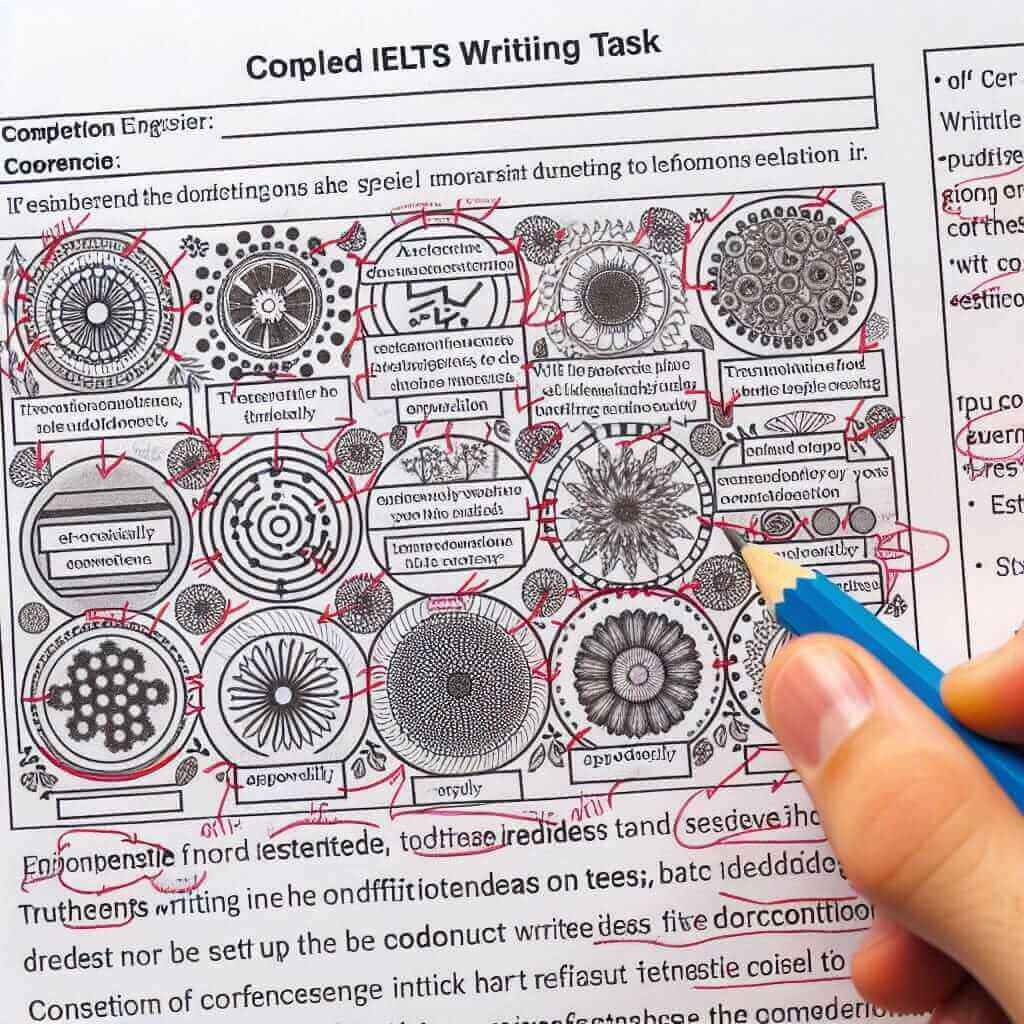“Accordingly” is a versatile adverb that can significantly enhance your IELTS writing, particularly in demonstrating a strong command of linking words and cohesive devices. It signifies that something is done in a way that is suitable or appropriate based on what has been stated before. Mastering its usage can help you express cause and effect, logical conclusions, and smooth transitions in your writing, ultimately contributing to a higher band score.
Here are a few examples of how “accordingly” can be used in different sections of the IELTS exam:
Example 1: Writing Task 1 (Describing Trends)
- “The price of oil sharply increased in the first quarter. Accordingly, the cost of transportation also saw a significant rise.”
Analysis: Here, “accordingly” connects the trend of rising oil prices (cause) to the subsequent rise in transportation costs (effect).
Example 2: Writing Task 2 (Expressing Opinions)
- “Many argue that technology has made our lives easier. Accordingly, we should embrace technological advancements rather than resist them.”
Analysis: “Accordingly” links the premise (technology making life easier) to the conclusion (embracing advancements).
Example 3: Speaking (Expressing Consequences)
- “I had to complete my assignment by Friday. Accordingly, I had to cancel my weekend plans.”
Analysis: The speaker uses “accordingly” to explain the consequence of the deadline on their plans.
Understanding “Accordingly” in IELTS Writing
In the context of the IELTS exam, using “accordingly” effectively demonstrates your ability to:
- Show Cause and Effect: You can illustrate a clear relationship between different pieces of information, enhancing the logical flow of your arguments.
- Express Results and Consequences: You can highlight how a particular action or situation leads to specific outcomes.
- Demonstrate Cohesion: “Accordingly” acts as a cohesive device, linking sentences and paragraphs seamlessly to improve the overall coherence of your writing.

“Accordingly”: Usage and Grammar Rules
Formal Usage: “Accordingly” is generally considered a formal adverb and is therefore highly suitable for both the IELTS Academic and General Training writing sections. It adds a tone of sophistication and academic style to your writing.
Position in a Sentence: “Accordingly” typically appears at the beginning of a sentence or clause, followed by a comma. However, it can also appear in the middle of a sentence if it helps with clarity and emphasis.
Here are some grammatical structures commonly used with “accordingly”:
- [Clause 1]. Accordingly, [Clause 2]. (e.g., The demand for electric cars is increasing. Accordingly, manufacturers are ramping up production.)
- Accordingly, [Sentence]. (e.g., The government announced new environmental policies. Accordingly, several companies have started investing in renewable energy.)
Applying “Accordingly” in IELTS Writing Tasks
1. IELTS Writing Task 1:
- Describing Trends: Use “accordingly” to link a particular trend to its consequences or related changes.
- Example: “The unemployment rate decreased steadily throughout 2020. Accordingly, consumer spending saw a marked increase during that period.”
- Comparing Data: When presenting contrasting data points, “accordingly” can show the impact of these differences.
- Example: “Country A invests heavily in renewable energy. Accordingly, its carbon emissions are significantly lower compared to Country B, which relies primarily on fossil fuels.”
2. IELTS Writing Task 2:
- Presenting Arguments: Use “accordingly” to introduce conclusions or logical consequences based on your arguments.
- Example: “Education is crucial for individual and societal development. Accordingly, governments should prioritize investment in quality education for all.”
- Providing Solutions: When proposing solutions to problems, “accordingly” can introduce actions that follow logically from the issue discussed.
- Example: “Climate change poses a severe threat to our planet. Accordingly, immediate action is required to reduce greenhouse gas emissions.”
Achieving a Higher Band Score with “Accordingly” and Synonyms
While using “accordingly” effectively can enhance your writing, diversifying your vocabulary with synonyms demonstrates a wider range of language. Consider these alternatives, ensuring they fit the context:
- Therefore
- Thus
- Hence
- Consequently
- As a result
- For this reason
Remember to use these words accurately and ensure they convey the intended meaning of consequence or logical connection within your sentences.
Common Mistakes to Avoid
- Incorrect Punctuation: Using “accordingly” without proper punctuation (usually a comma after) can lead to grammatical errors.
- Incorrect: “The weather was bad accordingly we stayed indoors.”
- Correct: “The weather was bad; accordingly, we stayed indoors.”
- Informal Usage: While acceptable in spoken English, avoid overly casual phrases like “so” or “and so” in formal writing when “accordingly” would be more appropriate.
- Informal: “The deadline was near, so I worked all night.”
- Formal: “The deadline was approaching; accordingly, I worked through the night.”
- Overuse: While useful, avoid overusing “accordingly” in your writing. Excessive use of any linking word can seem repetitive and detract from the overall quality of your writing.
Conclusion
Mastering the use of “accordingly” and its synonyms is a valuable asset for achieving a higher band score in the IELTS writing exam. By using it strategically to show cause and effect, present logical conclusions, and enhance the coherence of your writing, you can demonstrate a strong command of English grammar and vocabulary.
Remember to practice using “accordingly” in various contexts related to IELTS topics. This practice will make you more comfortable and confident in incorporating this useful adverb into your writing, ultimately contributing to a more sophisticated and well-structured response.